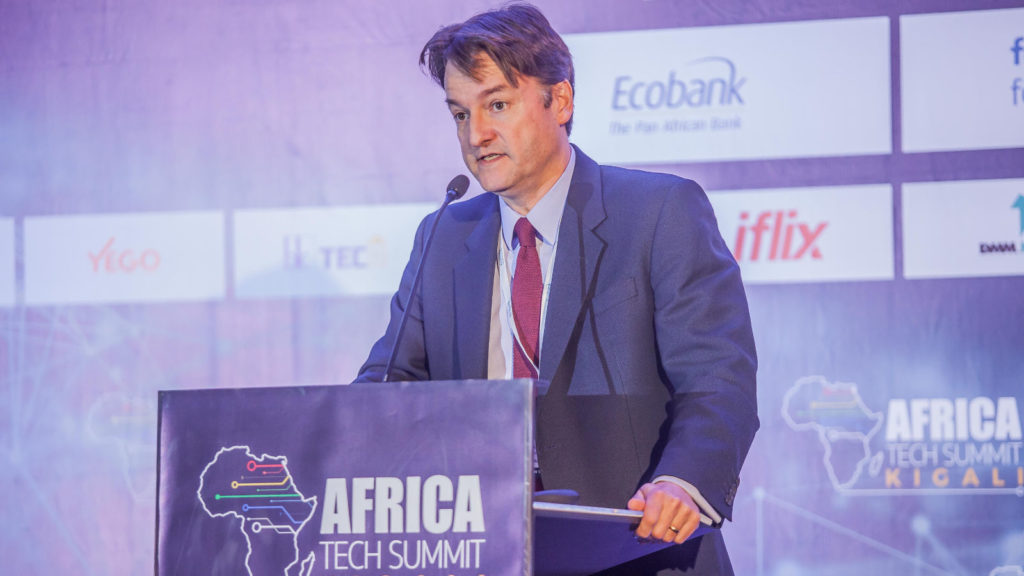We all have them. Those apps we open without thinking. Not because we need anything in particular, but because they feel… safe, in some…
7 insights we learnt about disruption on the continent at Africa Tech Summit

Disruptive tech in Africa is “accelerating and picking up speed” and there is a need for people to change their mindsets to keep up.
This is according to Ecobank head of research Edward George, speaking at the Africa Tech Summit in Kigali last week Wednesday (14 February).
“We are genuinely at the inflection point, so much has changed about the way people have done business. We need to change our mindset as well,” said George (pictured above).
He said this during a talk titled Stepping Up a Gear: The acceleration of disruptive technology across Sub-Saharan Africa in 2018.
Read more: Two-day Africa Tech Summit now under-away in Kigali
“In my view the key obstacle to the adoption of disruptive technology, it’s not money, it’s not infrastructure, it’s not even regulation. It’s mindset, how you get people to change the way they think, to change business as usual,” he said.
“That is the biggest challenge, that is the greatest opportunity,” he added.
Here are seven other interesting insights we picked up from his talk.
Tech innovation breaking barriers between businesses
“Every single business is being affected by disruptive technology and if you come across anyone who says, well that’s not really relevant to me, you’re talking to a dinosaur,” he said.
He added that not only is innovation “breaking down barriers between all businesses” but that by so doing it is making the lines between industries (and in turn, regulators responsible for these industries) murkier and less obvious.
“We have banks trying to get telco licences so they can offer mobile banking licenses. You have telcos that are trying to get banking licences so they can offer mobile banking products. Who is who, who do you regulate?” he said.
It’s not about the tech, more about the idea
“It’s not about the technology, it’s about the disruption,” he said, explaining that the focus within the tech ecosystem on the continent should not be on tech itself but rather its potential for disruption.
“Disruptive technology is not a fad, it’s not a gimmick and it’s certainly not a panacea. It is an enabler. How are you going to use this enabler? The big question is, is there a genuine user case?” he said.
“If you come up with something that is different and innovative and there is a user case for it, it will be successful,” he said, “Otherwise, it’s just a gimmick,” he added.
African countries are using disruptive tech to create financial identities and improve public services
He also commended African startups for their “characteristic” of “constantly flipping their models”.
“You find a fintech and they are really interesting, you see them six months to a year later, they might be doing something completely different. It may be the same technology but addressing a different issue,” he said.
“And that’s because it’s not about having a good idea once, it’s about taking that idea developing it and adapting it into reality on the ground,” he said.
‘No substitute for on the ground market knowledge’
“The reality is however good your technological innovation, there is no substitute for on the ground market knowledge. All of the successes that we’ve seen in technology in recent years have been because the individuals have gone to huge lengths to understand the market, to tease out problems, to test their solutions in response to market realities,” he said.
Giving M-Pesa as an example, he said the Kenyan startup “spent years sensitising the market to get people to believe that this mobile really is money”.
Still huge possibilities for fintech
He said despite 60% of active mobile wallets being in Africa, there is still “huge possibilities for fintech”.
“The important thing to bear in mind here is mobile is what’s driven this fintech revolution. We’ve grown from almost not having mobile phones 15 to 20 years ago, to now over 800 million people with a mobile phone. The problem is financial inclusion has not kept up with that,” he said.
‘Crowdfunding is as African as it gets’
George also made a case for crowdfunding, he said there have been informal lending networks in operation across Africa for many years, citing tontines in West Africa and harambee in Kenya.
“Crowdfunding is as African as it gets,” he said.
“If you digitise it you can hugely increase its efficiency and the amount of money that goes into the system,” he said citing startups like MaTontine from Senegal, SliceBiz from Ghana and M-changa who have moved to digitise informal lending networks.
Some African governments are driving initiatives around creation of financial identities
He said one of the reasons why most Africans are not part of the formal financial system is that they “don’t have correct information”.
“A lot of them don’t have any proper records at all, the ability to actually open a bank account can be very daunting for many people and they simply don’t do it, ” he said.
He added that a number of African governments are driving initiatives that aim to change this.
“The first is in Ghana, they’ve introduced the inclusive ID, a single digital identity, verification API that can be connected to many different payment platforms,” he said.
He also mentioned that Nigeria has developed a Bank Verification Number (BVN), which is “now essential to open a bank account”.
“That has helped reduce fraud because every bank account has a single BVN. So if you want to have 32 accounts with some dodgy money moving around, you can’t do that anymore,” he said.
Use of fintech to improve public services
For George, the use of tech to improve public services is “where the real interest in the digital front” is.
“Many state institutions in Africa, not so much in Rwanda, but certainly many other countries are very poor in terms of efficiency and ability to get data and fintech can really help on this one,” he said.
He mentioned initiatives like mSTAR which is reducing fraud and increasing efficiency by enabling the payment of government salaries over mobile phones in Liberia and Mozambique.
“We’ve also seen countries for example like Sierra Leone where they are trying to use the blockchain for the storing of essential public data,” he said.
“When it comes to accountability, there are many websites like Budeshi in Nigeria. What they have is all of the contracts going out for tender for the government, nearly US$3-billion worth on there,” he said.
“They say that we want transparency, let’s see who will the contracts be awarded to. Is it always to the same company? Is it always to the same person and how much actually was paid for that?” he said, adding that tech improve transparency and make public services more efficient.
Disclosure: Daniel Mpala was a guest at Africa Tech Summit Kigali
Featured image : Ecobank head of research Edward George (Supplied)


